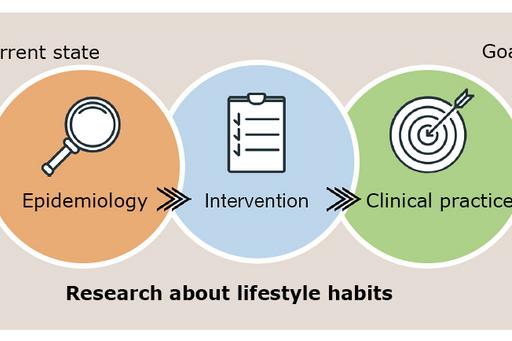
Our research
The Centre for Lifestyle Intervention conducts clinical research on changes in lifestyle. The goal is to develop personalised methods for lifestyle changes that can be maintained throughout life.
Lifestyle-related ill-health is increasing. Sedentary habits, unhealthy diet and tobacco use are some of the reasons that more and more people risk developing cardiovascular diseases, cancer and type-2 diabetes. The questions are how to design personalised interventions that actually work and how to implement these in the health and medical care system so that we are better able to prevent lifestyle-related diseases. These are the questions our research strives to answers.
Focus on secondary prevention
The health of the population should be both good and equitable. This means that everyone should have the same opportunities for good health. Achieving this requires good prevention to avoid the occurrence of disease. Prevention consists of two aspects. Primary prevention is to prevent disease from occurring. This is a joint responsibility shared by many in society, including primary care. Secondary prevention implies early discovery and treatment of ill-health. The health and medical care system has full responsibility for this aspect. The research at the Centre for Lifestyle Intervention focuses on secondary prevention.
A piece of the puzzle that has been missing
The University of Gothenburg and Sahlgrenska University Hospital conduct advanced epidemiology research (studies at the group and population levels) related to both diseases and the importance of lifestyle. We excel in such research as studies of diabetes and cardiovascular diseases, we develop new treatments and we provide highly specialised care nationwide. We have a solid understanding of the consequences of unhealthy lifestyles and how we can best treat different diseases. However, we need to better understand how to enable and sustain lifestyle changes throughout life. Once we’ve established the best approaches, this knowledge needs to be implemented in the health and medical care system, as illustrated in the figure below.

Collaborate with us!
The Centre for Lifestyle Intervention opened in 2022 and is currently starting up an intervention study focused on obesity. Patients offered an opportunity to participate in the study will receive personalised advice and support on factors like diet and physical activity. We will also begin a collaboration with the Unit for Diabetes Research at Östra Hospital and the SCAPIS study, which is a unique study within cardiovascular and chronic obstructive pulmonary disease. The SCAPIS study has randomly selected 30,000 Swedes ages 50–64 to undergo extensive health examinations – samples, tests, x-rays of organs and advanced imaging of the pulmonary system. The goal is to be able to predict who risks heart attacks or strokes and to provide treatment before illness occurs.
Ongoing research projects
LI-PAD
LI-PAD is a pilot project to investigate the effectiveness of personalized support over six months in reducing body weight by modifying dietary habits and physical activity among middle-aged individuals with overweight or early stage of obesity. In addition to its impact on body weight, the study also measures several modifiable risk factors for cardiovascular disease.
Read more about LI-PAD in this news article.

Physical Activity and Fitness in 80-Year-Olds: A Research Collaboration with the H70 Study
In late autumn 2024, a study on physical activity and fitness in 80-year-olds will be initiated at the Center for Lifestyle Interventions (CLI). This study is a collaborative project with the H70 research group led by Professor Ingmar Skoog and Professor Silke Kern. Participants from the H70 study, specifically individuals born in 1944, will be included in this research. The study aims to identify the association between physical activity and the incidence of dementia and other mental health disorders in this age group.
Regular physical activity is associated with good health and increased longevity. In the context of cardiovascular disease, physical activity serves both preventive and therapeutic roles. It also has positive effects on other health conditions, risk factors, and cognitive function. Fitness is strongly linked to engaging in physical activity at a sufficiently high intensity. While older adults tend to be less physically active than younger individuals, the specific patterns of physical activity in older populations are not yet fully understood. Moreover, the associations between physical activity, fitness, and risk factors for cognitive decline and mental health in the elderly are not well established. This study aims to explore these relationships, contributing to knowledge about normal aging by including healthy individuals in the investigation.
Research group leaders
About us
The Centre for Lifestyle Intervention is a clinical research centre at Östra Hospital and is operated by Sahlgrenska University Hospital and the Institute of Medicine at the University of Gothenburg.
Read more about us
Facts about lifestyles
Most cardiovascular disease and a third of all cancers can be prevented with healthier lifestyles.
Individuals who do not smoke, who eat healthy food, who are moderately active and who moderate their alcohol consumption live on average 14 years longer than those with unhealthy lifestyles.


